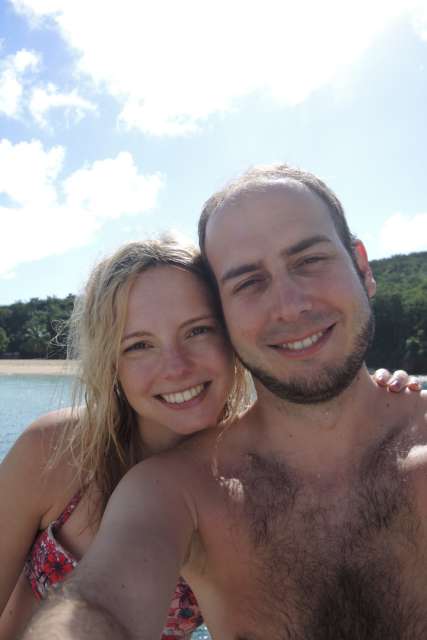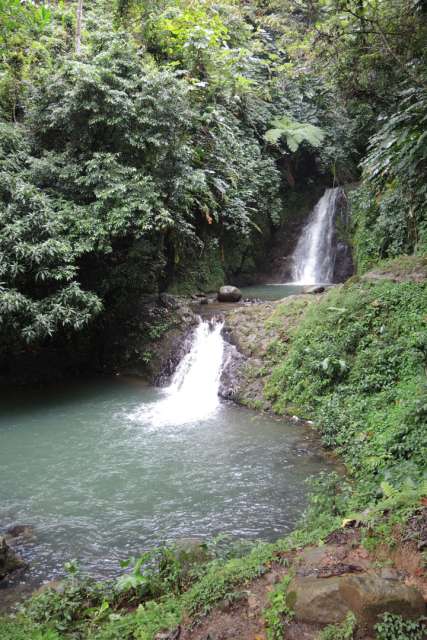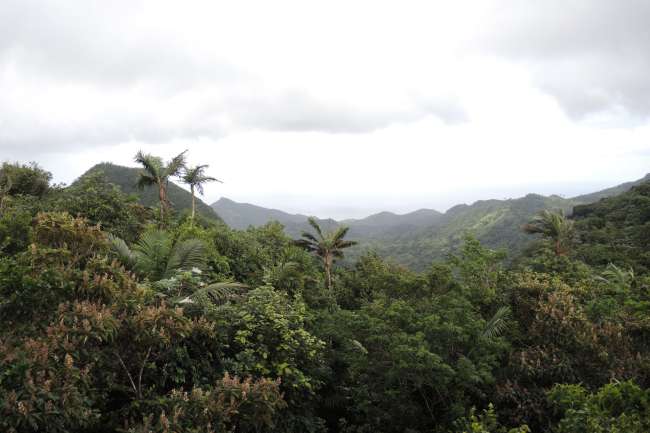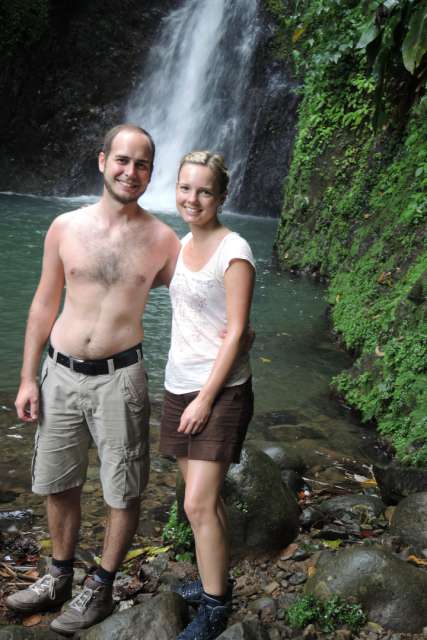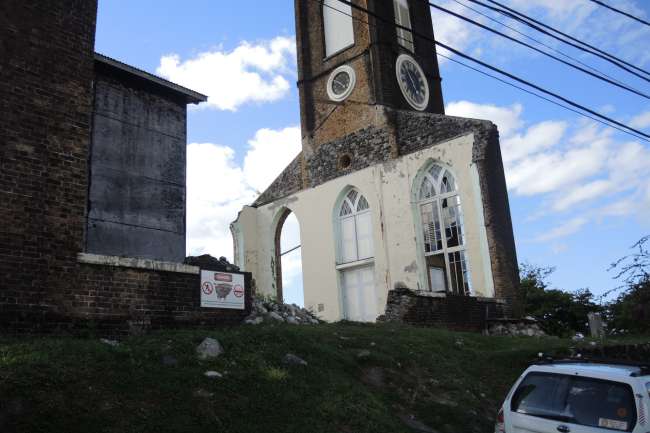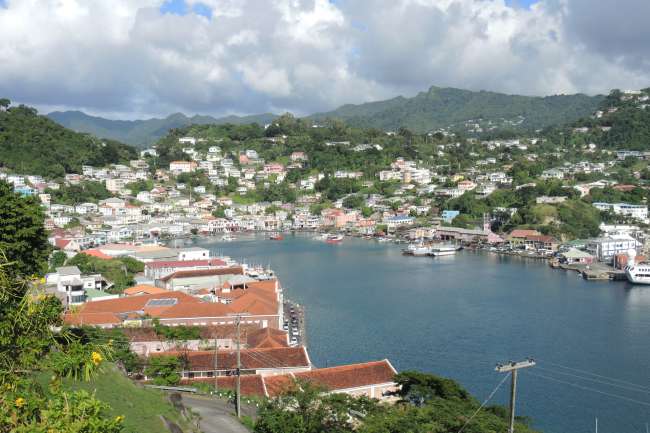Hiking, Monkeys and Sight Seeing in Grenada
प्रकाशित: 04.01.2017
समाचार पत्रिका के लिए सदस्यता लें
After our hiking tour in Grenada was somewhat chaotically rescheduled (yesterday nobody showed up, today the driver was an hour early :-D), we went on a hiking tour with our guide Christopher along small roads on the east coast of the island. No matter what was happening on the road behind the shuttle - if there was an interesting plant, a church (there seem to be more denominations than inhabitants here) or any other remarkable building on the roadside, he would stop in the middle of the road, with a lot of honking, to explain things to us. So we got a lot of information, or we could have, if we had been able to handle the strong slang a little better. We also learned a lot despite communication difficulties. Looks have often spoken more than a thousand words on our route, as it was very obvious how much damage Hurricane Ivan caused on the island in 2004. Several partially decayed and overgrown house and church ruins adorned the roadside.
Our first stop took us through a plantation where we learned more about plants and then descended into the rainforest. There, with the help of good footwear, we went down muddy, more or less fortified slopes and steps, over rocks and small streams, to the St. Margret Falls, also known as the Seven Sister Falls. This is actually a seven-tier waterfall, but only the lower two falls can be reached without climbing. They offered a truly impressive sight, and unlike the Toraille Waterfalls in St. Lucia, we were alone for some time. So we took the opportunity to cool off in the pool of the second waterfall in wonderfully cool, clear water. For the sake of our health, we politely declined to jump into the waterfalls, as many locals do here.
After this wonderful nature experience, we hiked back through the lush green rainforest, thankfully equipped with hiking poles. Of course, we had to climb the entire way back up. For the first time, we were very glad that we had chosen a rather cloudy and rainy day and that the full force of the sun was not beating down on us during the ascent.
A few hundred meters further on, we reached the Grand Etang National Park. At this point, we need to explain a bit about the local slang. We don't know to what extent the pronunciation has anything to do with the creole dialect Patois spoken here. But various genuinely French place names from colonial times are better understood on paper if you want to grasp their meaning. There is no chance of guessing their pronunciation. Grand Etang is classic French for 'big lake'. But here, everyone talks about 'gränitäng', just as with the Grand Anse that exists on every island - French for 'big beach' - it is always pronounced as a quick, terse 'grändäns'. Other examples include 'grosilee', which corresponds to the town of Gros Islet in St. Lucia, and 'lassadschess' - or rather 'La Sagesse' - our place of accommodation.
After the little language lesson, let's get back to the hiking. Due to the muddy paths caused by the recent rain and the simply exhausting high humidity, we decided to take a short route through the national park. It led us to two viewpoints from which we could see the Atlantic Ocean and the 'big lake' that gives the national park its name behind the green jungle of the rainforest and the highest mountains on the island. We also descended to the lake, a crater lake. Just as we were on our way back, a few Mona Monkeys (that's really what they're called) discovered the bananas that our guide had been carrying the whole time.
But don't imagine that we were standing around with the bananas, calling and waiting to see if a few monkeys would show up. The monkeys simply discovered the bananas in Christopher's hand while we were walking and then jumped onto the path to snatch them out of his hand in the next moment. So two monkeys sat in front of us on the road, stuffing bananas into themselves in a very clichéd way (that's the only fitting description for what we saw, the word 'eating' or even 'devouring' would be grossly understated here!).
After the tour, Christopher dropped us off in the capital of Grenada, which we wanted to explore a bit. St. Georges (Seint Dschordschäs) is a town with flair, a beautiful harbor, a (unfortunately already half closed in the afternoon) market, and a fort that can look back on a very eventful history but is unfortunately not presented accordingly. After sweating our way up the hill to Fort George with our shopping bags full of souvenirs in the midday heat, a really run-down heap of semi-ruins awaited us instead of a museum. Only the old cannons were neatly polished and aligned. For example, one could have reported here that in the early 1980s, Prime Minister Maurice Bishop saw the future for his recently independent country more in the approach to communist Cuba than in a not very promising relationship with America. When the Cubans then built an airport with a large runway for him, the Americans felt so threatened in their sphere of influence that they illegally invaded Grenada and exerted a little control. Maurice Bishop and several of his followers were killed on Fort Georges (of course, not by Americans ;-)).
After this eventful hiking-shopping-sightseeing tour, a taxi took us back to the hotel, where we had a fantastic dinner as usual. The first thing we will try at home is definitely a Banana Flambé. More will not be revealed.
समाचार पत्रिका के लिए सदस्यता लें
उत्तर (3)
Ingrid
Das find ich super, dann könnt ihr wenn ihr nach Einöd kommt ein Menü kreieren Jochen
Nachdem ich mich hier über das Fratzenbuch nicht einloggen konnte ("bad gateway?!?), hat es jetzt mit gmail geklappt.
Ich wünsche euch, dass ihr diesen Traumurlaub weiter genießen könnt!!!
Kommt gesund wieder!Jochen
Hier hat es gefährlich rutschigen Schneematsch auf den Straßen - ab morgen soll es saukalt (arktisch!) und damit glattschlüpfrig werden. Bringt ein paar Tonnen warme Karibik-Luft mit!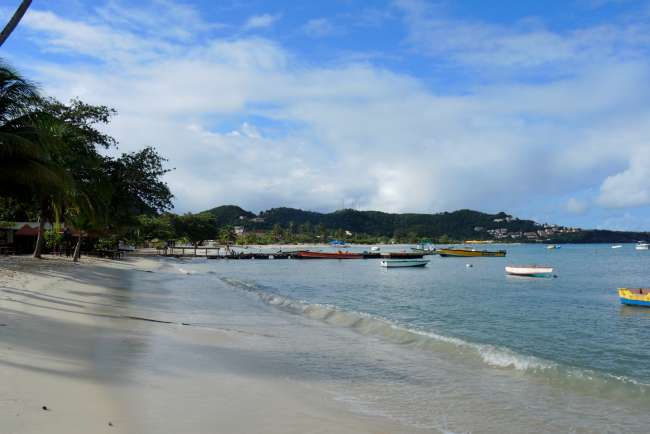
यात्रा रिपोर्ट ग्रेनेडा

